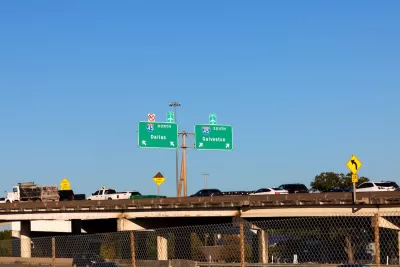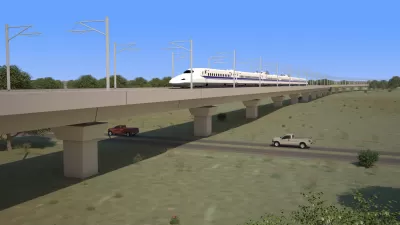The proposed rail line would link Dallas and Houston via a 90-minute trip.

Updated September 20 to include a response from the North Central Texas Council of Governments.
Texas officials say they will use eminent domain to acquire land needed for the 240-mile high-speed rail line planned between Dallas and Houston, reports Hugh Cameron in Newsweek. The Texas Supreme Court ruled that the project’s builder had eminent domain authority in one Leon County case in 2022.
According to a proposal presented to the Regional Transportation Council of the North Central Texas Council of Governments, the project requires the creation of a statewide high-speed rail authority. “This, they state, would require ‘provid[ing] counties and cities with expanded tools for land use control to preserve future transportation corridors and support land use, housing, school, and transportation connection policies that best serve growth needs.’” According to Texas Central, the train could remove up to 12,500 cars from Interstate 45 each day.
The project has gained momentum in recent months, with the federal government awarding Amtrak a $64 million grant for the line earlier this month, but its total estimated cost has gone up from $10 billion to over $33 billion as of a 2023 study.
In an email to Planetizen, a spokesperson for the North Central Texas Council of Governments clarified, “While the draft legislative proposal mentions eminent domain, it does so in the context of calling for continued support for the current statutory authority for local governments involved in the development of a freeway project, not high-speed rail. The goal is to retain local control of something that already exists.” The email also noted that the creation of a statewide high-speed rail authority is just one proposed avenue for moving the project forward.
FULL STORY: Texas Lawmakers Plan To Seize Land for Bullet Trains

Maui's Vacation Rental Debate Turns Ugly
Verbal attacks, misinformation campaigns and fistfights plague a high-stakes debate to convert thousands of vacation rentals into long-term housing.

Planetizen Federal Action Tracker
A weekly monitor of how Trump’s orders and actions are impacting planners and planning in America.

In Urban Planning, AI Prompting Could be the New Design Thinking
Creativity has long been key to great urban design. What if we see AI as our new creative partner?

Chicago’s Ghost Rails
Just beneath the surface of the modern city lie the remnants of its expansive early 20th-century streetcar system.

Baker Creek Pavilion: Blending Nature and Architecture in Knoxville
Knoxville’s urban wilderness planning initiative unveils the "Baker Creek Pavilion" to increase the city's access to green spaces.

Pedestrian Deaths Drop, Remain Twice as High as in 2009
Fatalities declined by 4 percent in 2024, but the U.S. is still nowhere close to ‘Vision Zero.’
Urban Design for Planners 1: Software Tools
This six-course series explores essential urban design concepts using open source software and equips planners with the tools they need to participate fully in the urban design process.
Planning for Universal Design
Learn the tools for implementing Universal Design in planning regulations.
planning NEXT
Appalachian Highlands Housing Partners
Mpact (founded as Rail~Volution)
City of Camden Redevelopment Agency
City of Astoria
City of Portland
City of Laramie





























